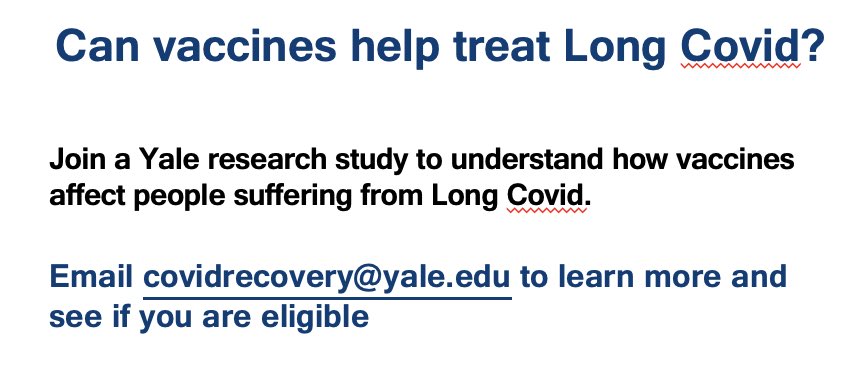
After many months of planning and hard work by so many (incl. @hmkyale @Dianaberrent @wade_schulz @CharleszYaleMed @Aaronmring @DaisySMassey @JeffGehlhausen), today, we are launching our research study to understand how vaccination may help improve #longcovid. 🧵 (1/n)
Pls RT🙏🏼
Pls RT🙏🏼

This study will examine how vaccines might improve the symptoms of #LongCovid. We are recruiting people with long covid (PCR+, Ab+, T-test+, or COVID diagnosed by medical doctor) who live in Connecticut, >18 years old, and have not received vaccines yet but are planning to. (2/n) 

To participate in this study, you will be asked to complete 4 online surveys and provide blood and saliva 3 times at sites in New Haven Connecticut. If you are interested in participating, please email covidrecovery@yale.edu (3/n)
The premise of this work is discussed here. We believe #longCovid can be caused by either persistent viral reservoir or autoimmunity. Vax-induced antibodies can eliminate the viral reservoir, and/or vax can reprogram autoreactive lymphocytes. (4/n)
elemental.medium.com/how-vaccines-m…
elemental.medium.com/how-vaccines-m…
This whole thing got started because of patient-led groups like @Survivor_Corps reporting on symptom improvement in a subset of long haulers, and informative #scicomm by @DanielGriffinMD on #TWiV (5/n)
https://twitter.com/VirusesImmunity/status/1366067849480048643?s=20
The person who really made this happen is @hmkyale. His patient-centered vision and ability to pull all the key people into this collaboration is inspiring. @DaisySMassey did the bulk of heavy lifting. @wade_schulz and @Yale_LabMed worked their magic in logistics. (6/n)
We will monitor immune profiles (cell types, phenotypes, cytokines, antibodies, T cells by @AdaptiveBiotech & autoantibodies by REAP @Aaronmring) before and after the vax and correlating the immune changes to symptom changes. We will measure mucosal immunity via saliva. (7/n)
The awesome members of my lab are eager and ready to get started, including @JeffGehlhausen @Carolinacas @sneakyvirus1 @peowenlu @tianyangmao @JulioJ_C @S_Tabachnikova @MelissaLV14 💪🏼 (8/n)
This study is happening in parallel with another #Longcovid immune profiling study that began this week with the @PutrinoLab at @IcahnMountSinai who has been a leading voice, dedicated to the treatment and rehabilitation of #longhaulers from the beginning. (9/n)
Ultimately, our hope is to learn about the underlying disease pathogenesis, sex differences in immunity and vaccine responses. Our dream is to come up with rational treatment approaches for #longCOVID and other post-acute viral syndromes #MECFS. Please spread the word 🙏🏼 (End)
• • •
Missing some Tweet in this thread? You can try to
force a refresh









